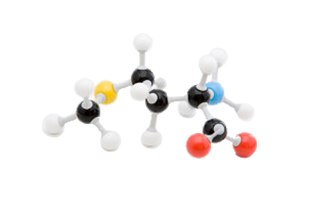Methionine
When in its natural L-form, methionine is a proteinogen amino acid. It is classed as an essential amino acid and cannot be synthesized by the body itself. This means that a sufficient supply of methionine in the diet or as a dietary supplement is of particular importance.
Sulphur compounds occur in all living creatures and have a multitude of functions. Besides cysteine, methionine is the only sulphur-containing amino acid. Furthermore methionine plays an important role in the synthesis of other proteins, such as carnitine or melatonine. Methionine has a fat-dissolving effect and reduces the depositing of fat in the liver.
Methionine is an important cartilage-forming substance
The cartilage in the joints requires sulphur for its production. If there is not enough sulphur available in the body, this can have negative effects for the healthy individual over the long term. People who suffer from arthritis can experience negative effects such as a prolonged healing process for the damaged tissue, if there is a sulphur deficiency at the beginning of the illness.
Studies have shown that the cartilage from healthy people contains approximately three times more suphur than in arthritis patients.1 To make things more complicated, various arthritis medications connect sulphur, which are the salts in the sulphuric acid. The demand for sulphur is increasing to more than average levels.
 It is advised to boost the body’s own sulphur production. The problem is that it is not possible to take sulphur in tablet form or dietary supplement. Instead, a supply of methionine can indirectly prove beneficial as in combination with the B vitamins, several sulphur-containing connections can be produced. Methionine is therefore meaningful in three ways: it has anti-inflammatory properties, is a pain-reliever and stimulates the formation of cartilage tissue.
It is advised to boost the body’s own sulphur production. The problem is that it is not possible to take sulphur in tablet form or dietary supplement. Instead, a supply of methionine can indirectly prove beneficial as in combination with the B vitamins, several sulphur-containing connections can be produced. Methionine is therefore meaningful in three ways: it has anti-inflammatory properties, is a pain-reliever and stimulates the formation of cartilage tissue.
Methionine strengthens the nails and works to combat hair loss
Owing to its capacity to form sulphurous chains which in turn connect with each other, methionine is able to strengthen the structure of hair and nails.2 A study published, resulting from a dermatology congress in Florence in 2006, found that the amount of hair found to be in the growth phase was significantly higher than the control group than the group of people who had taken methionine as part of an amino acid and vitamin B complex combination treatment.3
Sources
1 Soeken, K.L., Lee, W.L., Bausell, R.B., Agelli, M. & Berman, B.M. (2002) Safety and efficacy of S-adenosylmethionine (SAMe) for osteoarthritis, Journal of Family Practice, Volume 51, (pp. 425-430)
2 Haneke, E. & Baran, R. (2011) Micronutrients for Hair and Nails, Nutrition for healthy skin, Volume 2, (pp. 149-163)
3 Alonso, L. & Fuchs, E. (2006) The hair cycle, Journal of Cell Science, issue 119, (pp. 391-393)